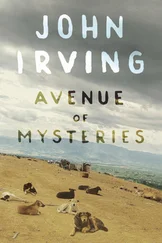“ OK with it?” Joni shook her head and went back to picking at her toes. “Weren’t you going to go buy a judo outfit? Go buy it then. Instead of playing Mr. Psychologist.”
Sigerius urges himself into action. Quit this observing. For five days he’s been observing his daughter. He studies her like an anthropologist, no, like an inquisitor. Often, now for instance, he notices nothing out of the ordinary: there she sits, Joni, upset by that awful story about Ennio, looking only like her own vulnerable self. But still. If he bumps into her in the hallway or on the path around the side of the house, or just a few minutes ago, when he happened to catch sight of her — each fresh meeting is a body blow. With each fresh sighting he sees what he first saw during the reception: an unnerving resemblance. He pushes open the living room door, catches Aaron’s eye and says: “You don’t need to buy a new judo outfit. Come with me.”
The irony of it is that he turned to the Internet because it seemed like a safe alternative. Until recently he thought: anything’s better than that debacle of a year and a half ago.
It all began at Jaap Visser’s farewell reception. Visser, head of Communications since the early ’80s, who had been at his post for about ten years too long, and whom he should have dealt with as soon as he became rector. Siem gave a concise, warm speech. The reception was held in the Bastille club, a grand, dark bowel of brick and burnished copper, where he stood at the end of the massive bar talking to Vlaar, his spokesman, and four of his policy assistants. And the same waitress kept coming by with a tray of drinks, a delicate Asian girl with an open, attractive face who looked him briefly but intensely in the eye every time she handed him a glass of white wine or mineral water. She looked at him as though she was waiting for his reaction to a witty comment.
By around seven, just before it had begun to thin out, he’d had enough. He went over to the far corner of the club, where Visser and his wife were surrounded by three timid sons and some ex-colleagues. He offered a round of handshakes, wished the man all the best, and tried to make it to the exit without getting buttonholed. The girl stood rinsing glasses at the end of the bar. As he put on his scarf and stuck his arm into the sleeve of his overcoat, he could feel her looking at him. “Wait a second,” she said when he made eye contact.
Later, when they couldn’t get enough of analyzing that first encounter, he told her that in his recollection she didn’t walk around the bar, but leapt over it like in a cartoon, to which she responded that she didn’t take kindly to being compared to a comic strip character.
“Don’t you remember me?” Dark-brown eyes streaked with slivers of bright copper looked up at him, she wasn’t that tall, but slender, and now that she was standing under his nose and he could smell her jet-black, put-up hair, she looked nothing at all like a comic strip character. It was a long time since he had stood so close to a young, unfamiliar woman.
“Give me a hint?” he said.
“No, that’s too easy. Put on your thinking cap.”
“Let me guess, you’re a Student Union officer.” He knew she wasn’t, but it seemed to him a complimentary remark.
“No, but give me a couple of years. Think.”
He looked at his watch and said he ought to be getting home. She said she thought a rector magnificus could decide for himself what time he got home. “I’ll help you out. It was … let’s see … six years ago.”
He acted as though he thought six years was an awful lot and surprised himself with a wisecrack: “Six years ago you were clapping out the erasers for your teacher.”
She poked him in the belly with her index finger. “Just for that you owe me a glass of wine.” With supple agility she slid behind the bar, uncorked a bottle in a flash and filled two glasses without spilling a drop. “Does the name Marij Star Busman ring a bell?” she asked without looking up.
No way, he thought. Are you Marij Star Busman’s daughter? He needn’t have felt terribly guilty that he didn’t see it: Marij Star Busman was a stout, strawberry-blond prototype Dutch woman whose heavy-set figure appeared more fertile than it actually was. In the early ’80s she and her husband had adopted this little Thai girl, and later a boy from Burma; the information arranged itself in his head. He’d got to know the family later, during his first year as rector, when he made it a priority to hire female professors. At that time Tubantia had just one, an embarrassing track record surpassed even by universities in the Islamic world. There had been a young female lecturer at Chemical Technology who published non-stop, even in Nature , and whom the students had elected teacher of the year. I must have her, he thought straightaway, and after an informal lunch he was even more convinced. Marij Star Busman was an ambitious, intelligent, extremely capable scientist who, he felt, had to be given a full professorship, and fast.
Hardly a week after he’d put his case to the university administration, he had received news of a pile-up on the misty A1 near Zwolle involving his new protégée, two hard, opposing but by no means self-canceling metallic jolts. At first, Marij Star Busman appeared to have escaped with just a broken nose, but after a few weeks she was nearly immobilized with back and neck pain. She ended up at home on the sofa with a neck brace, mood swings, and a memory like a soggy punchcard. Sigerius visited her every few weeks during her six-month recuperation, once or twice together with Tineke, and gradually a polite friendship took root. In addition to an extremely amiable husband and that Burmese toddler, a shy, skinny, slanty-eyed little girl fluttered around their Schothorst duplex; and the instant that same little girl, now a fully blossomed young woman, handed him a glass of wine, he remembered her name.
“Isabelle,” he said. “Welcome back to Enschede.”
To his chagrin, the family had moved to the west of the country after the dean of Chemical Technology started to quibble with Star Busman’s appointment (too young, too inexperienced, too difficult), tensions that, to make matters worse, the university newspaper got wind of. Predictably, the Delft University of Technology snapped her up with the offer of a department chair. Three years later Star Busman received the Spinoza Prize for the construction of complex molecules and hyperselective catalyzators. He felt justified in rubbing it in over at the stodgy chemists’ clique.
“Cheers,” her adopted daughter said. Isabelle showed an unbridled interest in his doings, subjecting him to a barrage of questions alternated with coquettish asides and charming titters, all of which contrived to make him increasingly shy. How he liked Enschede, why he didn’t take that Cabinet post (how did she know that?), how many of these dos did he have to “schlep” through, whether he still practiced judo. Did he remember that her little brother asked him what happened to his ears? No, he said, smiling, not mentioning that he also remembered precious little of the thirteen-year-old Isabelle. She told him that her mother was still grateful to him, even though things had taken such a weird turn. She told him she was studying management, lived in a “pretty OK” dorm and “sororitized” with Joni, who by the way had hazed her. She didn’t take her eyes off him, not even once. When he left the Bastille a half hour later and walked past the gym and the minimart on his way home, he felt a strange … lightness.
Two days later his secretary forwarded him an e-mail from a certain Isabelle Orthel. Isabelle Orthel? Only after reading the message—“Hi Siem, did the wine floor you too? Rotgut. Café De Appel in Hengelo has a really good red”—did he realize that Star Busman was her mother’s maiden name. But Isabelle Orthel wasn’t any name for a Thai girl, it was a name for a seventeenth-century French lyrical philosopher. Should he respond? It was a busy Wednesday, and he let his reluctant curiosity simmer for the rest of the day. In fact, he’d decided to drop it when, out of the blue, he sent off a reply just before heading home. “No hangover. Better to mail me at Sigerius@xs4all.nl from now on. Bye Isabelle.”
Читать дальше












